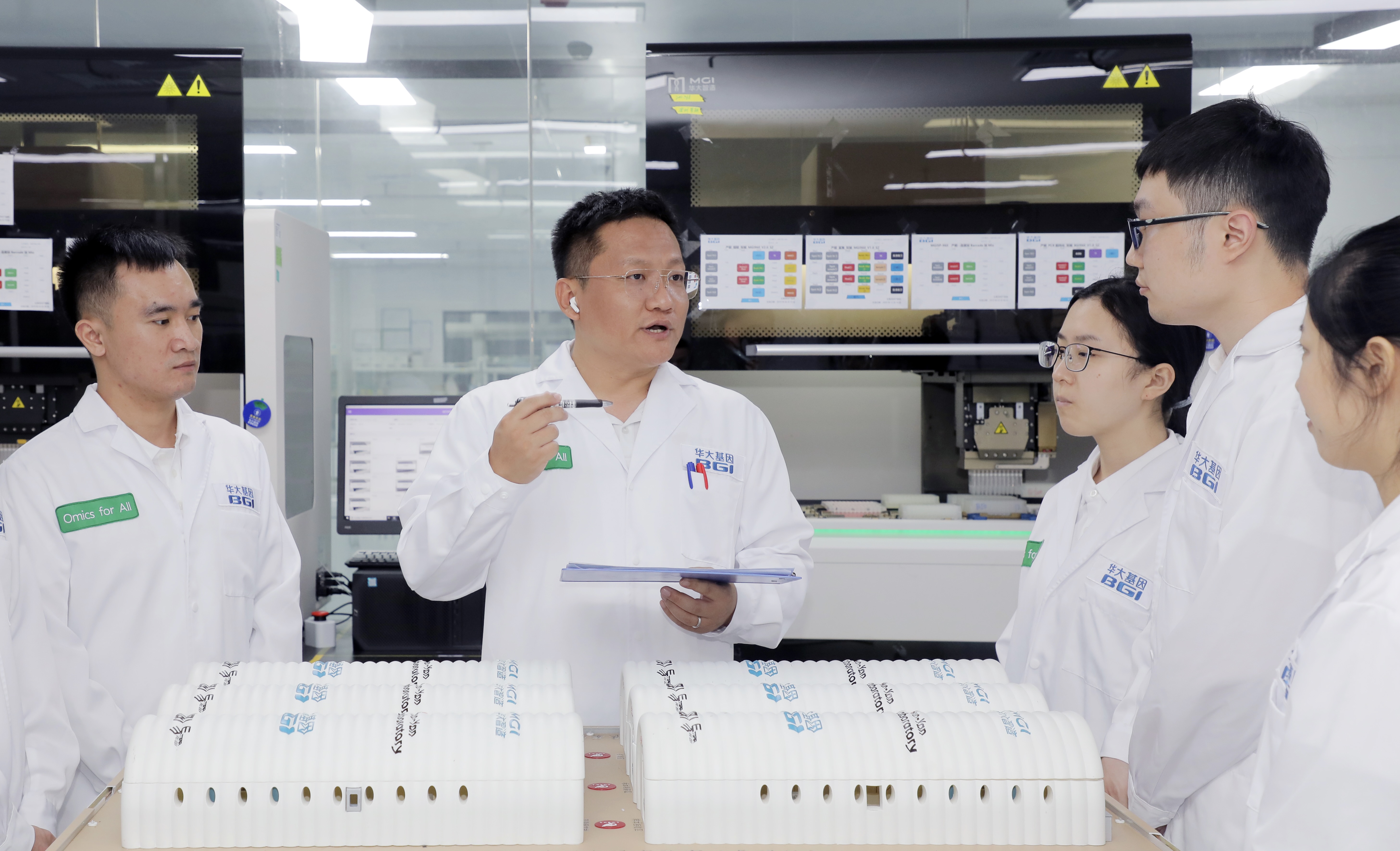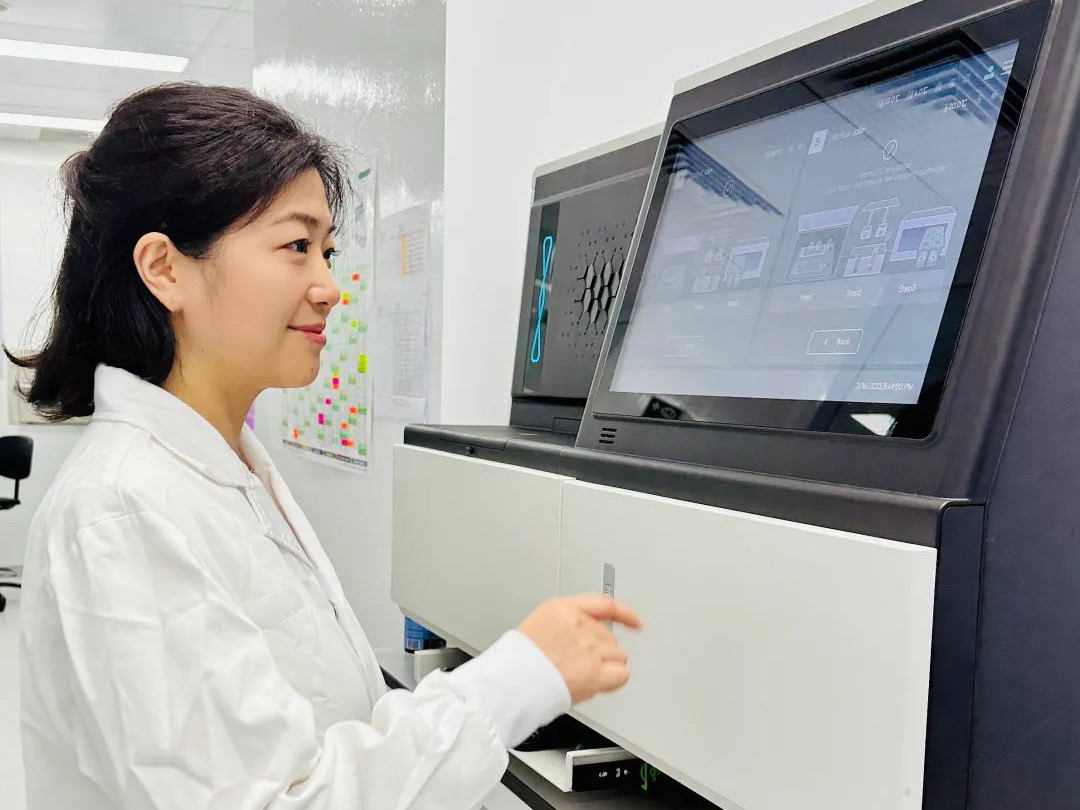The early days of the COVID-19 pandemic were marked by fear and uncertainty, as the virus swept across the globe at an alarming rate. Testing emerged as a critical tool in managing the spread and BGI Group’s work in this area would become instrumental in combating the pandemic and helping to establish a global standard for COVID-19 testing.
On January 14, 2020, BGI announced a remarkable achievement: within a mere 72 hours, it had completed the research and development of a SARS-CoV-2 nucleic acid detection kit. This rapid response positioned BGI among the first global entities to offer a solution for COVID-19 testing, drawing international attention. The need for an internationally agreed-upon standard for such testing was apparent, as the world united to combat the virus.
 Dr. Yin Ye, CEO and Executive Director of BGI Group (middle), is guiding the project implementation.
Dr. Yin Ye, CEO and Executive Director of BGI Group (middle), is guiding the project implementation.
The urgency for standardization was underscored on the evening of February 18, 2020, when Jiang Huayan, Director of the Quality and Standardization Office at BGI Group, and her colleagues received a call to action from the China Standardization Administration. The notice sought proposals for international standards, and the deadline was less than a day away. Led by BGI Group CEO and Executive Director Dr. Yin Ye, Jiang and her five colleagues worked through the night, drafting and translating the proposal, and submitted it to the committee the following day.
This proposal was later developed into ISO/TS 5798:2022, titled "In vitro diagnostic test systems - Requirements and recommendations for the detection of severe acute respiratory syndrome coronavirus 2 (SARS-CoV-2) by nucleic acid amplification methods." This technical specification sets forth the necessary requirements and guidelines for the design, development, verification, validation and implementation of nucleic acid amplification tests aimed at detecting SARS-CoV-2. It encompasses the entire testing process, including steps before, during, and after the examination of human specimens.
Drafting the proposal was just the beginning, and Jiang was mentally prepared for the challenges ahead. Indeed, the proposal's journey through the preliminary research phase was met with diverse opinions. The team painstakingly addressed and responded to 1,282 comments - a number Jiang remembered vividly - refining the standard clause by clause based on feedback from experts from around the world.
 Jiang Huayan, Director of the Quality and Standardization Office at BGI Group, works in a lab.
Jiang Huayan, Director of the Quality and Standardization Office at BGI Group, works in a lab.
Developing an international standard was intricate and laborious, but the team never wavered. "I have a particularly deep impression of the time we received feedback from an expert - there were as many as 130 comments," Jiang recounted. "They were very detailed, ranging from the standard's scope and content to the technical clauses, and even the editorial aspects of the proposal, such as the usage of specific prepositions and verb tenses."
The team had to address every single comment thoroughly to facilitate a better understanding of the proposal by the technical committee and garner their vote of support. "Although the work was tedious, we are especially grateful for the suggestions from these experts. Their advice not only perfected the content of the proposal but also gave us greater insight into the trending issues that various countries were focusing on in this field." Jiang added.
The process was iterative: vote, receive written feedback, vote again, and so on. Only after more than a dozen rounds, when the proposal received a two-thirds majority of approval votes, could the initiative be officially launched, and a joint working group formed to commence the development of the standard. Interestingly, many experts who initially raised objections joined this working group, including the one who had submitted 130 comments.
Sixteen months later, ISO/TS 5798:2022 was officially released. It set a record as the fastest-developed ISO/TC 212 standard not created through an accelerated process.
As of November 2023, BGI had contributed to or led the development and publication of 290 standards, with a further 105 under research. The published ones include seven international standards, 41 China national standards, and numerous industry, local, and corporate standards. In the face of a global crisis, BGI's efforts have not only been pivotal in shaping the international approach to COVID-19 testing but have also demonstrated the power of swift scientific response and international collaboration.
Today, as an expert of ISO/TC 212/JWG 6, Jiang continues her busy role in the international standardization of medical laboratory testing and in vitro diagnostic systems. BGI's performance has earned significant recognition from ISO/TC 212, leading to invitations for Jiang and her team to participate in the development of more international standard projects.



